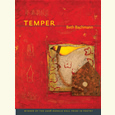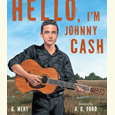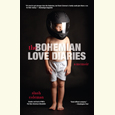The Original Pleasures
Kevin Young talks with Chapter 16 about poetry, food, music, and family
Ambitious yet grounded, scholarly yet impassioned, cerebral yet also playful, Kevin Young is one of those rare writers who does it all, and does it all well, including tweets about The Bachelorette. Author of seven books of poetry and an essay collection, and editor of eight more books, Young does work that embodies an inclusive sense of literary history and illustrates the interconnectivities between art and life. Whether he is talking about Modernism, blues singers, the slave ship Amistad, film noir, or one of many other subjects he has studied, he writes poems and essays that simultaneously serve as portals to the past and future.
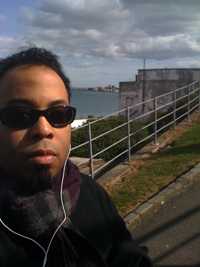 Young’s poetry books have won many awards, including a 2012 National Book Award for Ardency: A Chronicle of the Amistad Rebels. His latest book, The Grey Album: On the Blackness of Blackness, was a 2012 New York Times notable book, a finalist for the National Book Critics Circle Award, and most recently the winner of the 2013 PEN Open Award. Currently, Young serves as the Atticus Haygood Professor of Creative Writing and English and curator of Literary Collections and the Raymond Danowski Poetry Library at Emory University in Atlanta. He answered questions from Chapter 16 via email:
Young’s poetry books have won many awards, including a 2012 National Book Award for Ardency: A Chronicle of the Amistad Rebels. His latest book, The Grey Album: On the Blackness of Blackness, was a 2012 New York Times notable book, a finalist for the National Book Critics Circle Award, and most recently the winner of the 2013 PEN Open Award. Currently, Young serves as the Atticus Haygood Professor of Creative Writing and English and curator of Literary Collections and the Raymond Danowski Poetry Library at Emory University in Atlanta. He answered questions from Chapter 16 via email:
Chapter 16: The judges’ citation for the 2013 PEN Open Award said this about The Grey Album: On the Blackness of Blackness: “Here’s what happens when an acclaimed poet makes his first foray into nonfiction: madcap manifesto and rhapsodic reportage create a formidable blend of scholarship and memoir that tackles cultural and personal history in one breath.” In this book, you explain how Black Identity is not a separate part of American culture, arguing that it is our culture. And you do so partly by pointing out that art plays a central role in our lives. Could you provide a couple of examples that the book explores in depth?
Kevin Young: A big question! My starting assumption with The Grey Album was that African-American culture is a central part of American culture. I didn’t think this was so radical: just turn on (or is it stream?) the radio, and it becomes obvious. The 2013 MTV Video Music Awards were on the other night, and I don’t ever recall seeing so much black music played by people who weren’t black. I do think people needed reminding of the ways, say, in which the blues not only influenced American music—and, through jazz, world music—but the ways the blues aesthetic underpins much of what we think of as modernism, from T.S. Eliot to Langston Hughes. If I started with that idea, I ended up trying to name not just what’s black about American culture, but what was black about black culture.
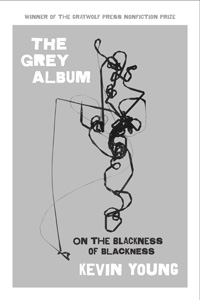 There’s also another idea coursing through The Grey Album about a hidden African-American tradition—and a tradition of hiding—that I call storying. Storying links the Negro spirituals and their codes for literal escape with modern-day codes of meaning in everything from soul music to hip-hop to poetry. I was trying in some way to uncover a unified theory of black culture—which is to say, American culture—and, like all such theories, you find out in the attempt what’s possible. The fun thing for me, and for readers too I hope, is the search.
There’s also another idea coursing through The Grey Album about a hidden African-American tradition—and a tradition of hiding—that I call storying. Storying links the Negro spirituals and their codes for literal escape with modern-day codes of meaning in everything from soul music to hip-hop to poetry. I was trying in some way to uncover a unified theory of black culture—which is to say, American culture—and, like all such theories, you find out in the attempt what’s possible. The fun thing for me, and for readers too I hope, is the search.
Chapter 16: Your poetry books are much more than simply collections of the years’ best poems: there’s often an overarching concept. Your latest poetry collection, for example, Ardency: A Chronicle of the Amistad Rebels, retells the story of the Africans who mutinied on the slave ship Amistad; To Repel Ghosts is, as you say, a “double album” based on the late artist Jean-Michel Basquiat; Black Maria is a film noir in verse. Could you talk about how you conceive of your collections’ themes and how you execute those ideas?
Young: Those you mentioned I think of particularly as long poems, especially Ghosts and Ardency. Ardency is an epic, really—it’s a book that took me twenty years to write. With the other books, what I find are not so much preconceived concepts as themes that emerge in the writing—in many ways, I began thinking of the book itself as another kind of form, one I could play with, whether that’s turning it into a film noir or a double album. With Ghosts it was only when I realized that what I was writing about Basquiat was a kind of “record” with different “sides” to the story that I was able to get it told.
I’ve been rereading the late Seamus Heaney, who was my old teacher, and am struck again by how his books hang together, revealing unities and connections. That’s more how life works, I suppose, a series of connections—and for me these things emerge organically. For instance, Dear Darkness began as a book of memories of times spent with my family in Louisiana—after the death of my father and grandmother just a few months apart, those same poems became elegiac. So I began writing the odes to crawfish and catfish and all the Southern food that we grew up eating as a way of wishing for all I missed. It’s a book of blues.
Chapter 16: Your next book of poems, Book of Hours, is due out in March 2014 from Knopf. Is there a concept framing those poems as well?
Young: Book of Hours returns in some way to the landscape of my father’s death—which is to say, of my life these past few years—he’ll have been gone ten years when it comes out. It’s less raw but also less metaphorical; if Dear Darkness was blues, this is more stark and spare. But it also has a center sequence, mostly about my wife’s pregnancy and our son’s birth and babyhood. So there’s a bit of hope there. The poems have been appearing for a while now, in The New Yorker and Poetry and elsewhere, so it’ll be nice to have them in one place, so they can sing together.
Chapter 16: The Best American Poetry of 2012 features one of your poems about a husband accompanying his wife to an obstetrical exam to hear their baby’s heartbeat. It is so refreshing to hear a male perspective on this subject. One of your many strengths is your diverse range of subjects. What are your major areas of interest right now?
Kevin Young: Though I’m mostly focused on Book of Hours, I’m also about halfway done with a new nonfiction book. It’s about hoaxes—an early chapter about fake memoirs came out in the Virginia Quarterly Review recently—and I’m working on a chapter about other kinds of liars now. It’s been fun, though exhausting tracking them down. Lots of people pretend, apparently! I’m trying to get at what makes people like would-be Clark Rockefeller or “JT LeRoy” pretend they are what they aren’t—and what makes some of us, for a time anyway, believe it.
I thought maybe me and poetry might break up since I’ve been seeing so much nonfiction lately, but there’s still some spark there, and looking forward to returning that way.
Chapter 16: In addition to being an accomplished writer, you are also an accomplished editor. Many readers might have heard about your anthology The Hungry Ear: Poems of Food and Drink on NPR’s The Splendid Table. What interested you about compiling an anthology on food and drink?
Young: Who wouldn’t? I like to eat and drink! Besides it being a human requirement, I also like savoring the things that food and drink do. Like poetry, food was taken for granted for a long time, I think. With things like the slow-food movement, and an emphasis on farm-to-table eating—the kinds of things my grandparents in Louisiana would just call food—it feels like we’ve recovered some of what makes eating such a pleasure.
I hope we are returning to poetry too. It’s one of the original pleasures.
Kevin Young will appear at Vanderbilt University in Nashville on September 26, 2013, at 7 p.m. in Wilson Hall, Room 126. The event is free and open to the public.

